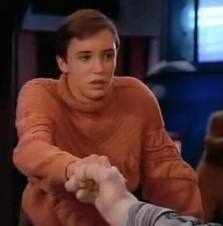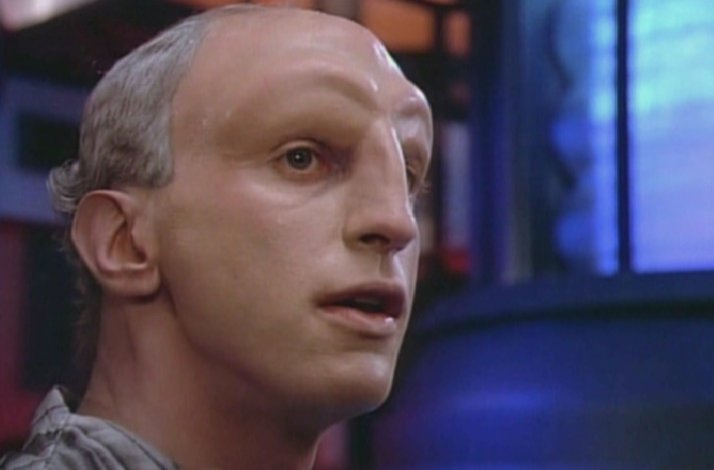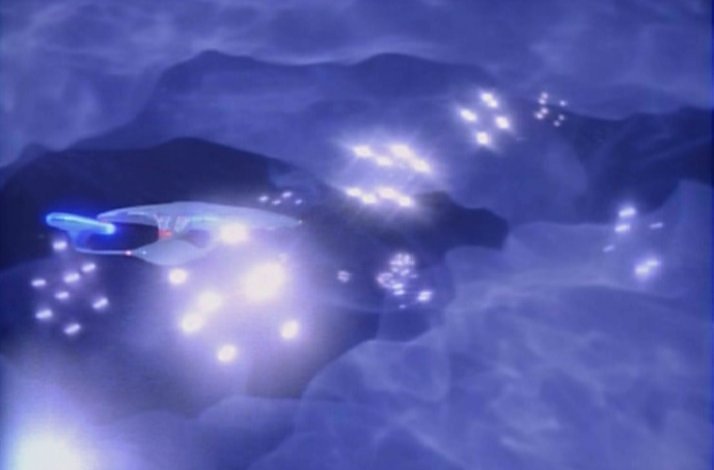“Where No One Has Gone Before”
Written by Diane Duane & Michael Reaves
Directed by Rob Bowman
Season 1, Episode 5
Production episode 40271-106
Original air date: October 26, 1987
Stardate: 41263.1
Captain’s Log: A propulsion specialist named Kosinski beams aboard. He is going to attempt new ways of entering warp drive and new intermix formulae to improve engine efficiency. However, Riker, Data, and Chief Engineer Argyle received Kosinski’s specs and found them to be gibberish, and their simulations showed that they did nothing to increase efficiency.
Kosinski himself is an arrogant ass who does nothing to endear himself to the crew. He has an assistant, whose name is unpronouncable, from Tau Alpha C. Riker and Argyle refuse to let Kosinski start his tests without explaining them first.
While he does so, Kosinski’s assistant notices Wesley noticing the work he’s doing. The assistant encourages Wesley to modify the equations to make them more efficient and seems impressed. He also lets Wesley watch as the test commences. The warp engines start to get hyperefficient, and the assistant starts to fade out as he seems to be communing with the engines as the ship zooms ahead, passing warp ten.
Picard orders the ship to stop, and they wind up in the M33 galaxy, three galaxies from home—2,700,000 light-years from their starting point. Kosinski has a nonsense explanation for what happened, but Wesley sees that his assistant is the one who did all the work. He sees what the equations really mean—that space, time, and thought are connected.
Of course, they need to get home, and Kosinski expresses confidence that he can do it again. He can’t, naturally, and this time Riker sees the assistant fade in and out as Wesley did. Whatever he does, though, makes things worse as now the Enterprise winds up in a place far outside known space where people’s thoughts can become reality.
Worf sees his pet targ, Yar finds herself back home on Turkana IV, Picard has tea with his mom, and other crewmembers see their fears, their desires, their dreams come alive. Picard puts the ship at general quarters and on red alert to help them focus and not let their thoughts almost literally run away with them.
However, it’s now known to everyone that the alien assistant is the one who’s really responsible, but the latest trip has rendered him unconscious. Crusher reluctantly wakes him with a stimulant. He identifies himself as a Traveler, and he explains that they are now in a realm of thought. Despite his weakness, he agrees to try to get the ship home.
This time the Traveler fades out completely, but not before sending the Enterprise back where they started.
Thank you, Counselor Obvious: “He’s convinced he’s right. I’ve no doubt of that.” Kosinski has spent the entire episode to date being arrogant and condescending, and this is the best her empathic senses can come up with? Given that he was talking through his hat pretty much from the moment he beamed aboard, it would’ve been nice if Troi sensed some of that deception….
Can’t We Just Reverse The Polarity?: “As the power grew, I applied the energy asymptomatically. I anticipated some tilling, but it didn’t occur. Now that was my error, using the bessel functions at the beginning.” Kosinski spouting really-o-truly-o technobabble, as he just made all that up to sound like he knows what he’s doing.

The boy!?: Wesley sees the truth of what’s happening before anyone else—at least in part because he’s the only one who notices the assistant as opposed to the bombastic Kosinski. The Traveler, in a private conversation with Picard, tells the captain that he must encourage Wesley’s genius, which he likens to that of Mozart. It leads to Picard making him an “acting ensign,” a rather ridiculous rank that nonetheless gives the producers an excuse to stick Wes on the bridge or in engineering thenceforth.
Welcome Aboard: Eric Menyuk makes the first of three appearances as the Traveler, coming back in the episodes “Remember Me” and “Journey’s End,” both times interacting with Wes. The late Stanley Kamel is magnificent as the blowhard Kosinski, oozing arrogance, overconfidence, and bull in equal measure. Herta Ware also provides tremendous gravitas as the image of Picard’s maman.
I Believe I Said That: “Reverse engines.”
“Captain, no one has ever reversed engines at this velocity.”
“Because no one has ever gone this fast. Reverse engines!”
Picard and Data trying to deal with the Enterprise’s speed.

Trivial Matters: This story is a reworking of co-writer Duane’s Star Trek novel The Wounded Sky, the first time one of the TV shows would use a novel as its basis. This is also the first outing for Bowman, who would become one of the most prolific Next Generation directors. Chief Engineer Argyle is the second member of the First Season Chief Engineer Derby, and the only one to appear twice—he was also in David Gerrold’s novelization of “Encounter at Farpoint,” so he might well have been part of the original conception. Amusingly, he’s descirbed as “one of our chief engineers,” probably to explain his presence after seeing MacDougal in “The Naked Now.”
Make It So: The strongest episode of the first season, an excellent science fiction premise, and a good character study. This episode also provides some of the first strong performances from many of the regulars. Jonathan Frakes is considerably less stiff as he rides Kosinski, both Denise Crosby and Michael Dorn do excellent work with their glances into their respective pasts, and Wil Wheaton’s youthful enthusiasm doesn’t bleed into the goofy. Best of all, though, is Sir Patrick Stewart, who just nails every scene, none more so than his encounter with his long-dead mother, in which he conveys tremendous emotion and pain with the most subtle facial expressions and vocal inflections.
Best of all, though, is that this episode sees the Enterprise exploring the strangest of possible new worlds. But it’s with a price, as Picard points out: that far from home, who would they report their findings to?
Just excellent stuff from two writers with a great resumé: Duane is responsible for some of the finest Star Trek novels, and Reaves’s writing career has also been stellar. A true high point of the show’s run.
Warp factor rating: 8
Keith R.A. DeCandido has written a bunch of Star Trek novels, but none of them were the basis of episodes. He’s not at all bitter about that. Really. However, his novel A Singular Destiny was the bridge between the best-selling Destiny trilogy and the Typhon Pact series. Follow him online at his blog or on Facebook or Twitter under the username KRADeC.










